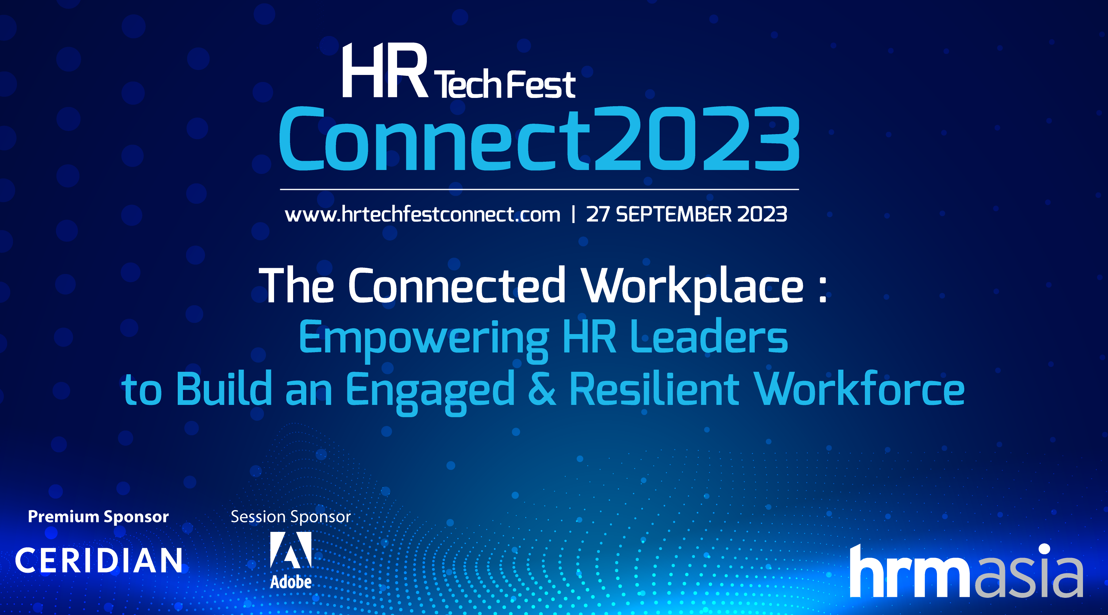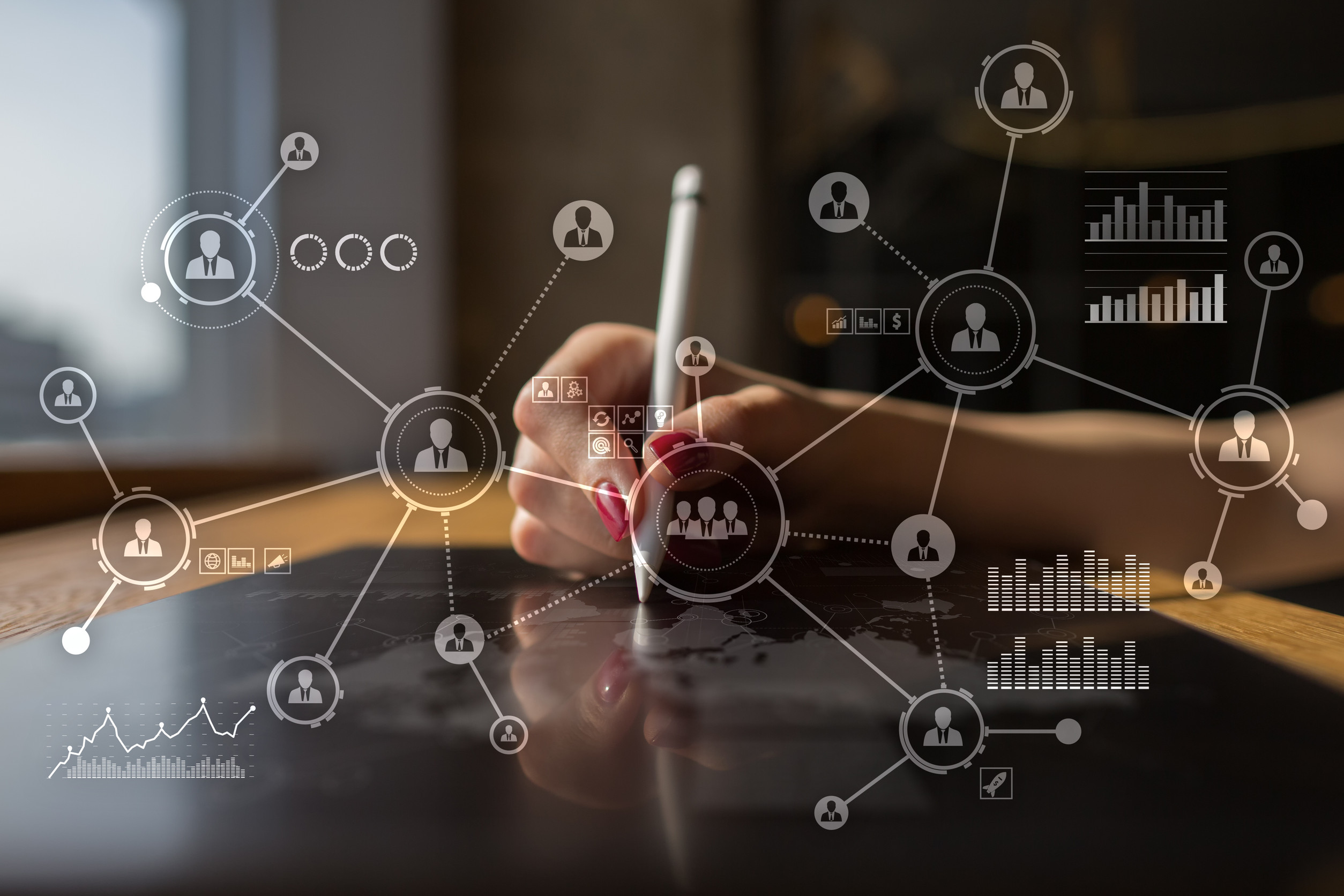A people-first focus for a connected workplace: HR Tech Fest Connect 2023
- Champa Ha
- Topics: Asia-Pacific, Compensation and Benefits, Compliance, DE&I, Digital Transformation, Employee Experience, Employment Law, ESG, Flexible Work, Health and Wellness, Home Page - Featured, Home Page - News, HR Technology, Job Cuts, Leadership, Learning and Development, MICE, Mobility, News, Professional Development, Recruitment, Restructuring, South Asia, Southeast Asia, Talent Management, Topics

HR Tech Fest Connect 2023, organised by HRM Asia, concluded with resounding success, offering valuable insights and strategies for HR leaders navigating the complex landscape of the post-pandemic world. Centred on the theme, The Connected Workplace: Empowering HR Leaders to Build an Engaged and Resilient Workforce, the event addressed critical issues of workforce engagement, motivation, and growth in challenging times.
The virtual event started off with an opening keynote by Arthur Carmazzi, Founder, Directive Communication Psychology, who sought to showcase and exemplify just how people development and training in the workplace can be diversified if organisations were willing to use AI and gamerfication behaviour to train employees.
“We want training to be fun but ultimately, imagine the concept of going on a literal journey where you have different quests,” he elaborated. “Rather than finding swords, money, or something, (trainees are) finding solutions to real-world problems. Once you solve them, you can go on to the next quest. Each one of these parts of your career is many little quests.” To achieve this, however, he said, organisations need to acknowledge that employees and leaders may have differing motivations and character alignment leadership styles. AI, in turn, can help resolve those issues by asking questions, and thus design a different quest and training simulation that reflects real-world scenarios.
In the next session, Rob Squires, Vice-President and Regional Head of Asia and Japan, Ceridian, highlighted the seismic shifts occurring within the modern workplace. He pointed out that traditional work methods are rapidly becoming obsolete as organisations grapple with complexity and seek sustainable strategies for success. Ceridian’s 2023 Executive Survey, shared by Squires, revealed a sense of optimism among leaders with 82% in Singapore confident about achieving their 2023 goals and 77% anticipating strong revenue growth.
Squires also provided an overview of the concept of the “boundless workforce”, which encapsulates a fluid, always-on, and borderless workforce. While this new paradigm offers advantages such as easier talent acquisition, Squires emphasised the need for organisations to invest strategically in technology and training to optimise this workforce fully.
Moving on to the HR landscape, Stacey Harries, Chief Research Officer, Sapient Insights Group, highlighted the global talent challenges stemming from the Great Resignation, labour shortages, and a significant skills gap, exacerbated by the retirement of Baby Boomers, which affected industries and regions worldwide. Even in the Asia-Pacific market with its younger workforce, the impending retirement of experienced employees posed unique challenges, emphasising the need for agile talent strategies, she said. “In 2023, we encountered new challenges, including a cooling economy and business consolidations, especially in the high-tech sector. Global conversations and supply-demand dynamics added complexity. Despite the highest labour force participation since 2020, we’re still seeing uncertainties around employee preferences and the types of roles they seek.”
Eliana Carmel, Chief People Officer, Agoda, shed light on the urgent need for a transformative approach to talent management in the digital age. As industries and job markets undergo profound changes, securing top talent has become a decisive competitive advantage.
Carmel outlined Agoda’s three core pillars of talent management—Hire, Inspire, and Retain. The Hire pillar focuses on attracting diverse, high-quality candidates regardless of location; Inspire equips managers with tools to build top-performing teams; and Retain emphasises employee engagement and retention. This framework, she added, combined with a commitment to invest in its people, offers HR professionals a structured approach to thrive in a rapidly evolving talent landscape, where individualised and flexible work models are the future.
And with more workspaces becoming digital to manage the increasing shifts towards hybrid work, leaders can take to adapting and reshaping their spaces to enhance the employee experience, especially in the wake of the pandemic. Engagement at work is now digital first and much of it is streamlined without having the employees be physically there.
“Hybrid workplaces are the new norm, and everything we do now is experience-driven,” said Pranshul Pahuja, Solutions Consultant – Document Cloud, Adobe. Experience, he emphasised, at work is now non-negotiable, and more organisations are streamlining the work employees experience thanks to organisations becoming more digitally mature at an increasingly rapid rate. However, siloed and manual processes that still exist within organisations can cause inefficiency in productivity, as well as increase errors made and waste in resources. With the use of technology exemplified by Adobe, processes such as onboarding, employee engagement and security become streamlined, and uncompromised. Organisations need to look into upgrading their tools to push for better workflows, Pahuja said.
Also joining HR Tech Fest Connect 2023 was Go Ashokh Menon, Agile Coach and Facilitator, One Synergy Global, who said, “Since 2020, we’ve all been focused on crisis management. We’ve stopped economic activities and business activities. This year we’ve been focused on driving economic growth, but are we looking into the trends that impact us?”
Menon continued to delve into the discussion sharing that while growth is something that all organisations are aspired to look into, many organisations do not necessarily know and identify the frameworks to help them develop. Sharing three steps that organisations can take to look at trends: by reviewing them, repurposing teams, and re-energising leaders. Trends, in this case, are not about predicting the future but the patterns that emerge that can affect consumer behaviour and impact business. Using TRENDS as an acronym, Menon defined them as Technology (the new technology and sciences that affect the way we work), Regulations (the new rules and reviewing bodies that help to keep organisations in check), Environment (the global climate issues that may affect how and where we work, New (upcoming topics and affairs that may spring up from the issues and aspects brought about by the pandemic), Demographics (which includes having to take note of the rising social challenges brought about by changing population numbers), and Social Values (focusing on managing a multi-generational workforce that is worried about job security). From there, he continued, employers can then organise and engage their employees to navigate the future.
Employee engagement is the key buzzword amongst HR leaders today, and much of the hospitality industry with chains across the world, are always looking for new ways to support and push employees to the next level. Andrew Newmark, CHRO APEC, Marriott International,shared just how the organisation is working to cultivate a work environment that engages and supports their employees globally across multiple regions.
Having emerged from the pandemic affected by downsizing, changing operation requirements on a day-to-day basis, and the personal effect on employees’ personal lives, the brand’s TakeCare philosophy saw various initiatives that pushed for mental and physical wellbeing while also uncompromising in training for their employees. Much of the employee engagement within Marriott International, he emphasised, was bound by three factors: growing great leaders across all levels through programmes such as the Emerging Leadership Programme, investing in employees by giving them access to safe spaces and resources that addressed mental wellbeing through digital means, and making sure opportunities to success was available by getting employees to share their experiences and reducing barriers to hiring.
In an enlightening fireside chat, Alisha Fernando, Head of Diversity and Inclusion, Asia-Pacific, Bloomberg; and Rajiv Mirwani, Head of Bloomberg South Asia, shared their organisation’s approach to employee wellbeing. They stressed the importance of considering both emotional and physical wellbeing, with a specific focus on mental health.
Fernando elaborated Bloomberg’s commitment to tackling the stigma and narrative around mental health was demonstrated when their Chairman, Peter T. Grauer, joined the Time to Change campaign in 2019. She also highlighted the challenges faced by their colleagues during the social unrest in Hong Kong in the same year, which prompted Bloomberg to develop a resilient team workshop. Recognising the broader community’s needs, they extended their resiliency programme to corporate philanthropy partners, extending support to those external to the organisations.
To address the pressing issue of employee burnout, as put by Manish Arneja, Managing Partner, SEA, Resilience Institute, has become an increasing phenomenon in organisations due to the changes in demand outstripping the capacity of employees to cope, resulting in issues such as absenteeism, exhaustion, cynicism, and inefficacy amongst employees. In his session, he asked employers to recognise the signs of burnout in employees and how it affects their workforce and productivity levels. Using the example of Jacinda Ardern, former Prime Minister of New Zealand, who resigned from her post as she admitted she had no more in her personal energy resource to continue in her role, Arneja pointed out that often, this burnout, when unaddressed, leads to the supposed most resilient employee to quit, leaving only less qualified employees to take charge within the organisation.
“Employees who experience burnout cannot handle stress,” Arneja emphasised. To curb this, Arneja pushed for organisational leaders to measure and address stress at work as a priority for leaders to take more accountability when it comes to managing this and help impose resiliency skills amongst employees to better manage their stress in a stigma-proof manner.
Organisations that are looking to transform their processes through an eco-friendly and sustainable process would have enjoyed what Schneider Electric had to offer, with Nathalie Huynh, Cluster HR Director, Schneider Electric, leading the discussion. In her session, Huynh sought to share what kind of environment the organisation is looking to develop to push for sustainability, which starts with developing and shaping employees to develop a strong skillset based on their experiences, aspirations, potential and performance. This involves deepening their pre-existing skillset while increasing the breadth of new skills. The skillsets are transferable to the discussion of environmental sustainability: employees can use what they know on what regards to sustainability in terms of their knowledge and skillset and branch out to learn more from experts about subjects they may have a cursory knowledge about.
Schneider Electric does this via training programmes such as Climate Fresk, which helps employees understand more about climate change via workshops. “We are a purpose-driven organisation,” said Huynh. “And beyond sustainability skills, we hope to encourage all people to take the lead in initiatives when it comes to discussing sustainability.”
Siemens is also actively investing in green skills. Miriam Sake, Senior Vice-President, People and Organisation, ASEAN, Siemens, presented a case study on how the organisation is driving the future of work in the vibrant ASEAN market of Siemens to ensure sustainable employment for its employees. Comparing the example of an iceberg, Sake noted that the immediate understanding of digitalisation and new technologies involves changing processes and roles, but not many would be able to see just how to explore new ways of working in the future. This requires much understanding of the challenges affecting global workforce transformation, which includes looking into trends and how they impact different business models and applying them to the organisation. Exploring reskilling and upskilling of employees within the Siemens factory is one that yielded positive results, affecting 1,200 employees of both blue-collar and white-collar jobs. Sake shared that Siemens was looking into bringing employees together in a resilience and relevance scale to promote lifelong learning and make them future-ready.
HR Tech Fest Connect 2023 also hosted a panel discussion moderated by Dr Sandhya Karpe, Human Capital Centre Leader, Asia and Programme Director of Asia Diversity, Equity and Inclusion Council, The Conference Board, HR leaders addressed the critical challenges of understanding and engaging Gen Z in the workplace.
Joining the session as a panellist is Ruth Gellert-Neale, Chief Human Resources Officer Technology, APAC and EMEA, JLL, who said, “Gen Z is a fascinating generation, and what we’ve observed is that they are the first digital-native cohort, having grown up with technology in ways previous generations haven’t.”
David Lim, Senior Vice-President, Human Resources, Asia-Pacific, PVH Corp, highlighted his organisation’s commitment to enhancing employer branding and creating an environment focused on empowerment, equality, advancement, and community engagement. Leveraging business resource groups (BRGs), including the multigenerational BRG, PVH Corp facilitates ongoing dialogues with Gen Z employees to address their priorities, such as learning and career development, workplace flexibility, effective communication, and access to company information.
READ MORE: Empowering HR leaders to build an engaged and resilient workforce
“It’s a combination of factors that defines their experience,” added Wong Yang Sheng, Head of HR for Singapore, Australia and Brunei, Standard Chartered Bank. “Gen Z is truly a product of their environment, having navigated the challenges of a pandemic and entering the workforce that had experienced many years of economic growth but now is followed by recession, all while adapting to evolving work practices.”
HR Tech Fest Connect 2023 concluded with a closing keynote by Kris Wadia, CEO, Humanized Leadership, who shared strategies to enhance organisation’s bottom line by motivating employees and boosting productivity. He started the session with a checklist aimed at avoiding common operational pitfalls in employee engagement programmes and guided attendees in integrating successful employee engagement strategies throughout the employee lifecycle, from recruitment to corporate culture development.
“To effectively engage employees, it is essential to take the time to walk the floor, talk to people, understand their challenges, and gather them together for face-to-face discussions. There is no substitute for this personal interaction in any employee engagement programme,” he concluded.






